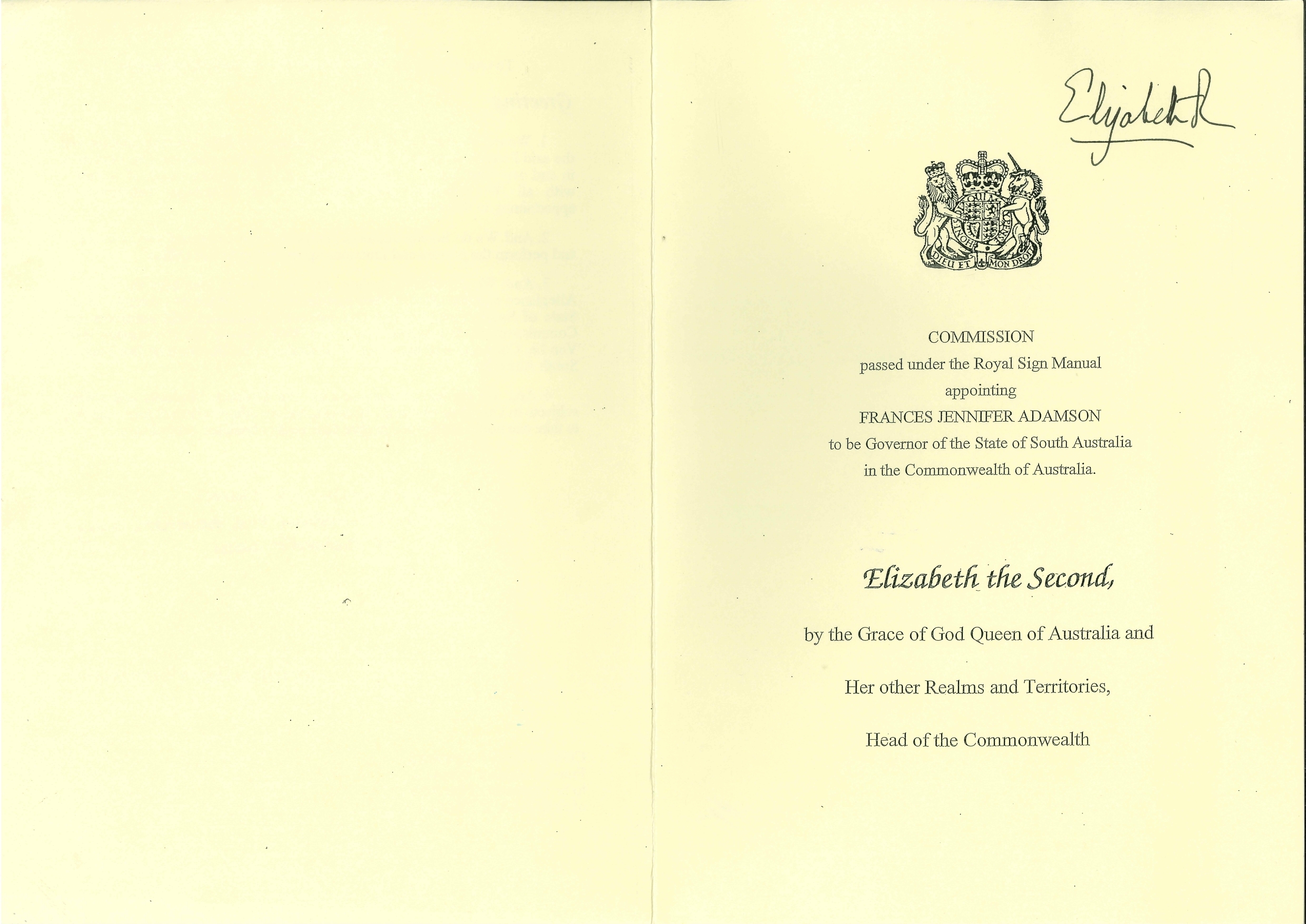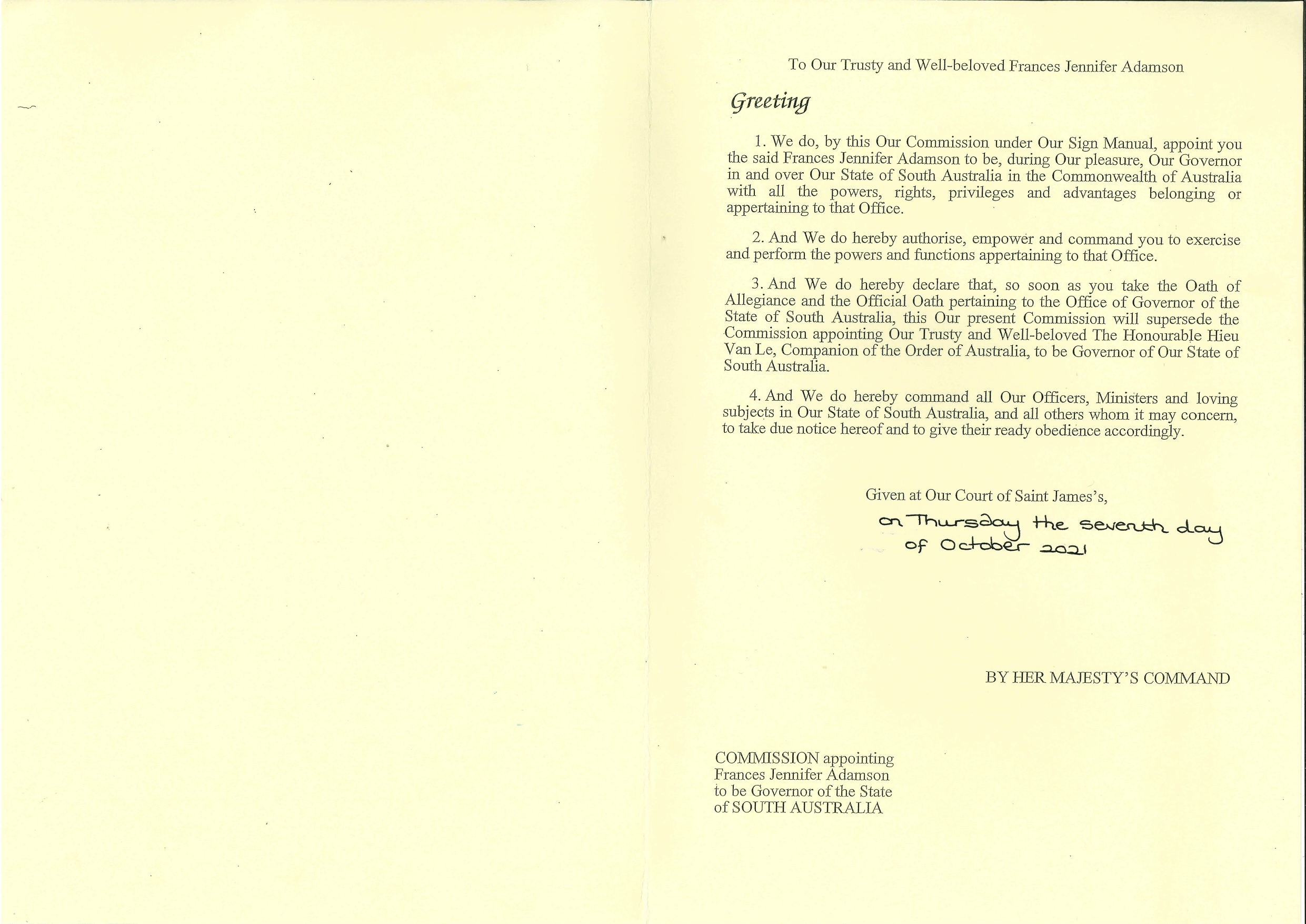
Role of the Governor
Her Excellency the Honourable Frances Adamson AC is the 36th Governor of South Australia and representative of His Majesty King Charles III, South Australia’s Head of State.
Her Excellency the Honourable Frances Adamson AC is the 36th Governor of South Australia and representative of His Majesty King Charles III, South Australia’s Head of State.
The Governor is appointed by The King on the recommendation of the Premier of South Australia, usually for a term of five-years, although this period can be extended by agreement between the Governor and the Premier.
The primary task of the Governor is to perform the Sovereign’s constitutional duties on His Majesty’s behalf, acting within the principles of parliamentary democracy to ensure that South Australia enjoys a stable government that commands the popular support of the Parliament of South Australia.
Historically, the Governor alone determined matters of policy, made laws, and was responsible to the United Kingdom Government for the management of the Colony.
While the Governor does not participate in the political process in modern day South Australia, the Governor acts upon the advice given by members of Executive Council.
Given the Governor’s place as the Head of South Australia’s constitutional structure, it is important that the Governor remains apolitical and impartial, and it is for this reason that the Governor does not vote in elections.
Today, the Governor’s role and responsibilities fall into three broad categories:
The Governor of South Australia has specific constitutional and statutory powers to oversee the workings of the South Australia Government and ensure that it acts within the boundaries of the State’s Constitution and the rule of law.
It is the Governor’s duty to sign all Bills that have been passed by the Parliament of South Australia in order to make them part of the law of South Australia.
The Governor regularly presides over a meeting of the Executive Council, comprising the Premier of South Australia and Ministers.
The Governor has a duty to ensure that the processes of Executive Council are conducted lawfully and regularly and may ask questions and seek further information from cabinet ministers.
The Governor has other statutory powers, including the power to:
- Dissolve the Parliament of South Australia and issue writs for a general election;
- Issue writs for the election of South Australian representatives in the Australian Senate;
- Appoint the Premier of South Australia and Ministry from the party with majority political support in the House of Assembly to form Government;
- Determine dates of Parliamentary sessions;
- Issue regulations and proclamations;
- Appoint judges, Royal Commissioners, and individuals to statutory boards and to tribunals.
All items for the approval of the Governor in Executive Council must first be considered by Cabinet, with the exception of the assent to Acts.
The Governor in Executive Council also has a number of other key roles, such as approving the Governor’s Speech for the Opening of Parliament.
The Governor officiates and represents the South Australian community at a range of significant ceremonial occasions, celebrations and commemorations, including the formal Opening of Parliament, representation at military parades and other special occasions of State and national significance such as Australia Day and Anzac Day commemorations.
The Governor conducts a series of Investiture Ceremonies at Government House, Adelaide to confer South Australian awards and honours.
The Governor also receives and hosts Ambassadors, High Commissioners, Heads of State and other notable visitors to South Australia.
The Governor has an important community role in promoting values and ideals that support a strong South Australian community through support and goodwill.
On behalf of the community, the Governor conveys recognition and gratitude to those who make these contributions and encourages South Australians to continue their extraordinary work.
As part of the community engagement role, the Governor’s duties include:
- An extensive program of travel throughout South Australia, including visits to each of South Australia’s 68 local government areas;
- Hosting receptions at Government House to recognise the contributions made by individuals or organisations to the South Australian community;
- Officiating at or attending award ceremonies to encourage and acknowledge the achievements of individuals and organisations;
- Granting of patronage to many community not-for-profit organisations;
- Hosting receptions for local, state, and national organisations and groups.
The Governor and Mr Bunten live at Government House, Adelaide. The Governor’s community engagement also includes the use of Government House for the benefit of the community, including:
- Offering tours of Government House to school and community groups;
- Allowing the use of the grounds for the SACE Merit awards;
- Facilitating Open House events at Government House each year.
A copy of the Governor's Commission signed by Her Majesty The Queen.




